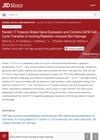 39 citations,
January 2015 in “International journal for parasitology/International Journal for Parasitology”
39 citations,
January 2015 in “International journal for parasitology/International Journal for Parasitology” Epidermal keratinocytes start wound healing and inflammation after schistosome infection.
Ribonucleotide excision repair is crucial to prevent skin cancer.
 207 citations,
March 2012 in “Development”
207 citations,
March 2012 in “Development” Skin needs dermal β-catenin activity for hair growth and skin cell multiplication.
 27 citations,
November 2013 in “Dermatologic Therapy”
27 citations,
November 2013 in “Dermatologic Therapy” New test predicts if hair loss treatment will work.
 32 citations,
March 2021 in “Journal of cosmetic dermatology (Print)”
32 citations,
March 2021 in “Journal of cosmetic dermatology (Print)” COVID-19 infection may trigger alopecia areata in some patients.
220 citations,
June 2013 in “The Journal of Pathology” Lichen planopilaris may be an autoimmune disease causing hair loss due to immune system issues in hair follicles.
9 citations,
October 1994 in “Brain Research” Fetal sheep develop skin nerve pathways and responses to touch and heat between 75 and 134 days of gestation.
54 citations,
September 2012 in “The journal of investigative dermatology/Journal of investigative dermatology” Vitamin A affects hair loss and immune response in alopecia areata.
 3 citations,
July 2023 in “The journal of investigative dermatology/Journal of investigative dermatology”
3 citations,
July 2023 in “The journal of investigative dermatology/Journal of investigative dermatology” Keratin 17 is important for skin's response to radiation, affecting many genes and cell division.
 2 citations,
August 2023 in “Autophagy”
2 citations,
August 2023 in “Autophagy” Autophagy helps control skin inflammation and cancer responses and regulates hair growth by affecting stem cell activity.
 April 2024 in “Skin appendage disorders”
April 2024 in “Skin appendage disorders” Environmental pollutants can damage hair health and cause hair loss.
 August 2024 in “Receptors”
August 2024 in “Receptors” Vitamin D receptor is crucial for skin wound healing.
 1 citations,
May 2023 in “Fertility and sterility”
1 citations,
May 2023 in “Fertility and sterility” Men who went through puberty later had lower sperm counts and altered hormone levels, possibly affecting fertility.
22 citations,
July 2015 in “PloS one” Foxp1 helps control hair stem cell growth and response to stress during hair growth cycles.
 185 citations,
August 2005 in “Autoimmunity Reviews”
185 citations,
August 2005 in “Autoimmunity Reviews” Alopecia areata is an autoimmune condition causing hair loss due to the immune system attacking hair follicles, often influenced by genetics and stress.
139 citations,
October 2005 in “Journal of Investigative Dermatology” The nail matrix has a reduced immune response, protecting it from autoimmunity.
 30 citations,
October 2016 in “Current research in translational medicine”
30 citations,
October 2016 in “Current research in translational medicine” Hair follicles on the scalp interact with and respond to the nervous system, influencing their own behavior and growth.
16 citations,
August 1996 in “The journal of experimental zoology/Journal of experimental zoology” Red deer hair cells offer a new way to study how hormones affect hair growth.
34 citations,
March 2007 in “Biochemical and Biophysical Research Communications” Thioredoxin reductase 1 does not affect glucocorticoid receptor activity in hair follicle cells.
56 citations,
August 1994 in “PubMed” Prolactin and melatonin can stimulate hair growth in Cashmere goat hair follicles, but melatonin may reduce follicle viability over time.
119 citations,
December 2008 in “The journal of investigative dermatology/Journal of investigative dermatology” Nanoparticles can deliver vaccines through hair follicles, triggering immune responses and providing protection.
 67 citations,
July 2016 in “Reviews in Endocrine and Metabolic Disorders”
67 citations,
July 2016 in “Reviews in Endocrine and Metabolic Disorders” Stress can worsen skin conditions by affecting hormone levels and immune response.
 7 citations,
July 2014 in “Reproductive Biomedicine Online”
7 citations,
July 2014 in “Reproductive Biomedicine Online” The length of CAG repeats in the androgen receptor gene is linked to ovarian reserve but does not affect how the ovaries respond to stimulation.
 7 citations,
January 2021 in “Evidence-based complementary and alternative medicine”
7 citations,
January 2021 in “Evidence-based complementary and alternative medicine” Porphyra-334 may help reduce wrinkles and promote hair growth.
3 citations,
July 2023 in “International journal of molecular sciences” Stress may contribute to hair loss in alopecia areata by affecting immune responses and cell death in hair follicles.
 December 2024 in “Journal of Cutaneous and Aesthetic Surgery”
December 2024 in “Journal of Cutaneous and Aesthetic Surgery” Dermoscopy effectively assesses and improves acne scar treatments.
38 citations,
March 1997 in “Journal of interferon & cytokine research” IL-1β inhibits human hair follicle growth.
 21 citations,
November 2017 in “Scientific Reports”
21 citations,
November 2017 in “Scientific Reports” Different human hair follicle stem cells grow at different rates and respond differently to a baldness-related compound.
 1 citations,
July 2024 in “Journal of Cosmetic Dermatology”
1 citations,
July 2024 in “Journal of Cosmetic Dermatology” Low SULT activity in hair follicles leads to better response to oral minoxidil for hair loss.
3 citations,
February 2021 in “FEBS open bio” Camellia japonica extract may improve scalp health and promote hair growth.

















